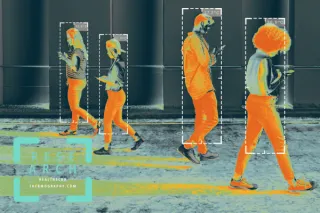Thermography @ The Apathecary Clarksville
Call to schedule your thermal imaging session at The Apathecary for September 5!
What Is Thermography
Thermography is a great tool that serves everyone seeking proactive wellness insights. Whether you're optimizing your health journey or addressing ongoing concerns, thermal imaging provides valuable perspective. By understanding your body's unique thermal signature, you can make informed choices to support lasting vitality and prevent future health challenges.
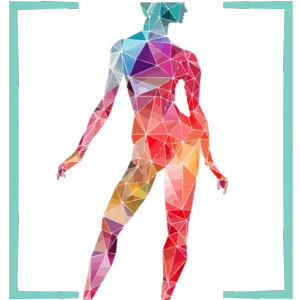
Why Inflammation Matters
Think of inflammation like your body's warning light system. Put simply, your body can speak through temperature fluctuations throughout the body:
more heat => active inflammation
more inflammation => brighter colors
more color => stronger patterns
A key To vibrant health is managing inflammation. Inflammation can be tracked by thermal imaging with an infrared camera. A thermogram reveals your thermal signature or heat map, which can show vital bio patterns and key related imbalances, primarily inflammation.
The colors of your heat map show what your body knows, like clues to a deeper story.
Inflammation relates to:
Neck Tension
Back Strain
Joint Issues
Muscle Stress
Hormone imbalances
Heightened immune activity
Sluggish lymph and congestion
Stagnant nerve & energy flow
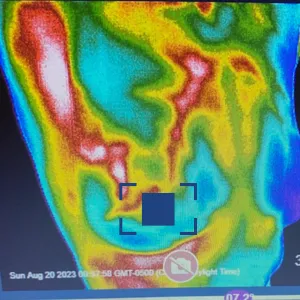
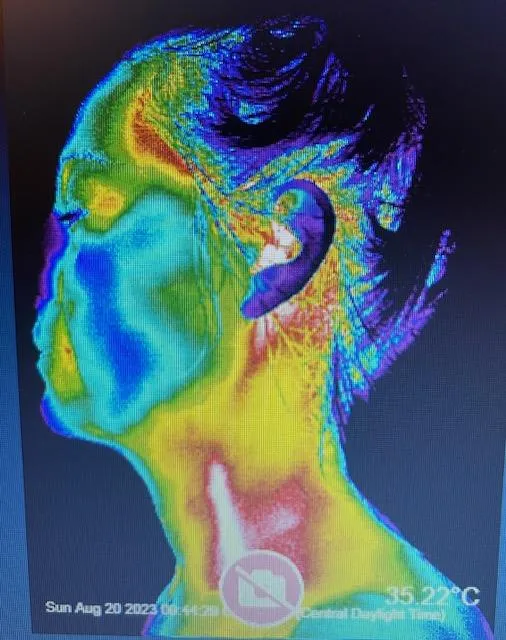
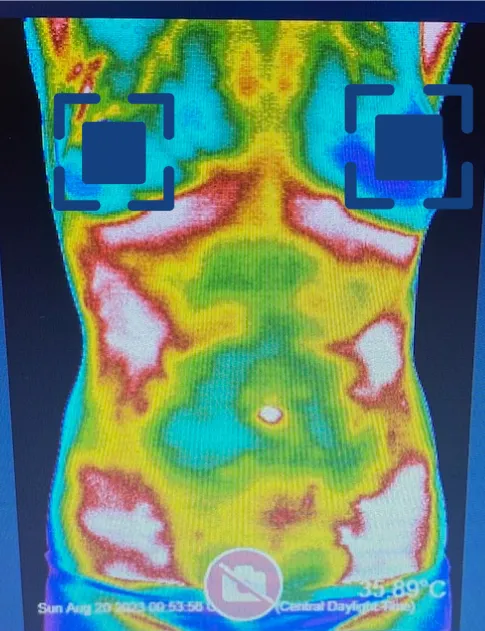
CLIENT REVIEWS
"Melinda made me feel so comfortable. The whole process was fast and easy. So grateful for the insights."

Erica
What Makes Us Different
Health Scan Thermography provides advanced health technology services to help you take charge of your healing journey. With over 22 years in the wellness field, we live by the adage "physician, heal thyself." Thermography captures a heat map of your bio patterns, enabling early detection of chronic inflammation. The metals + minerals scan and bioresonance technology provides real-time insight into the deeper layers of your system's health and empowers you to take charge of your well being.

Common Questions
Understanding new technology comes with questions.
Here are some common initial questions.
General Thermography Information...
Is radiation involved?
No! Thermography is completely radiation-free, using only infrared imaging to detect heat patterns.
What affects a thermogram?
Recent exercise, hot showers, lotions, deodorants, and physical therapy can influence results. Follow preparation guidelines for best outcomes.
No exercise
No hot showers
No lotions or body oils
No deodorants
No physical therapy,
...as all of the above can influence results
Follow the preparation guidelines for best outcomes.
Will thermography hurt?
The process is entirely non-invasive and pain-free. There's no contact with your body during imaging.
How long does a session take?
Your appointment typically lasts 30 minutes, with the actual imaging taking about 15-20 minutes. The full body studies take about 45 minutes.
How often should I get imaged?
After your initial session, it's recommended to take another thermal study three months later to establishes your baseline. Follow-up frequency varies based on your health goals and practitioner recommendations.
Should I reschedule if I'm sick?
Yes. Acute illness can affect body temperature patterns. Please wait until you're fully recovered.
Is it okay to eat before my imaging?
Generally, it's best not to eat anything 2 hours before your appointment, especially avoid hot or frozen beverages 2 hours before. Otherwise, feel free to maintain your normal eating schedule.
What if I have a sunburn?
Yes, you'll need to reschedule, as this affects thermal imaging accuracy.
Can I schedule while menstruating?
Certainly.
Can I schedule while breastfeeding?
Only if there's a specific concern. Baseline scans should wait until 3 months after completing lactation.
Thermography Tech Information...
What does thermal imaging measure?
Thermography evaluates subtle temperature variations across the body's surface which can correlate with underlying physiological responses and functional changes, providing clues about overall wellness.
How can variations in temperature patterns be meaningful?
Alterations from an individual's baseline thermal signature can pinpoint areas where internal physiological responses like inflammation are manifesting, revealing functional changes warranting discussion with one's healthcare team. This can help primary providers discern focus areas and identify incongruence against a patient's unique baseline readings over time.
Why do Health Scan Thermography's protocols matter?
Their specialized training and use of standardized protocols controlled for variables like room temperature ensure consistency and optimize comparison of a customer's images against computerized digital archives to reliably identify notable temperature variations.
What advantages does thermography offer compared to other diagnostic tools?
Thermography provides a non-invasive, radiation-free evaluation of the body's surface temperature patterns to detect subtle changes impossible to feel. This offers a wellness perspective complementing standard testing.
What can thermal imaging detect? What are the limitations?
Early signs of inflammation, circulatory concerns, structural weaknesses and other imbalances have been associated with certain non-optimal thermal patterns imaged through advanced thermography protocols. While it cannot visually detect or diagnose specific diseases, thermography may uncover areas needing further conventional testing and allow practitioners to monitor treatment progress over time through biofeedback of temperature changes.
Thermography Prep Instructions...
On the day of my session, what should I be aware of?
To ensure your thermography study is most clear, please note the following on the day of your imaging session:
- Wear loose, comfortable clothing
- Remove jewelry from scan areas
- Arrive 15 minutes early to adjust to room temperature
- Inform technician of recent injuries or skin changes
- Note any current medications or supplements
- Avoid deodorant or creams on the skin, especially oils.
- No heat lamps, hot packs, cold packs or sunburn you will have to reschedule.
- Do not shave area to be imaged, especially for men's faces!
- For head imaging, do not eat for at least 2 hours prior.
- No gum chewing.
- Though your car needs to be cool while in transit to your appointment, please avoid blowing the A/C directly onto your body.
What do I need to do to prepare for thermography?
As this is a tool that measures temperature variations in the body, 24 hours before an imaging session avoid the following:
1. Avoid exercise 4 hours before appointment
2. Skip hot showers, saunas, steam rooms, cold plunges or sun exposure 4 hours prior
3. No physical therapy, chiropractic or acupuncture 24 hours before
4. No massage or lymph treatments
5. Refrain from smoking and alcohol for 4 hours before scan
6. Stay well-hydrated
7. Get adequate rest the night before
8. Avoid scheduling during acute illness
9. Females, note where you are in your menstrual cycle
It's also important to note the following:
-- No breast surgery, chemotherapy or radiation treatments 3 months prior to your imaging.
-- No breast biopsy for one month prior.
-- Lactation: Imaging is recommended if there is a problem or concern. However, a baseline is not recommended for at least 3 months after the last active breastfeeding.

Thermography Research & More
Thermography as a Breast Cancer Screening Technique: A Review Article
Globally, breast cancer is the most frequently occurring cancer in women and is the reason for more disability-adjusted life years lost than any other type of cancer. Hence, early screening plays a vi... ...more
Thermography Research & More
June 30, 2025•1 min read
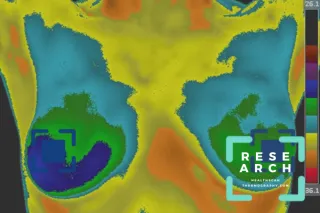
Advances in Infrared Thermography: Surgical aspects, vascular changes, and pain monitoring in veterinary medicine
One of the main functions of infrared thermography (IRT) consists in detecting temperature changes in organisms caused by variations in surface blood circulation. IRT is a useful tool that has been us... ...more
Thermography Research & More
April 23, 2025•1 min read
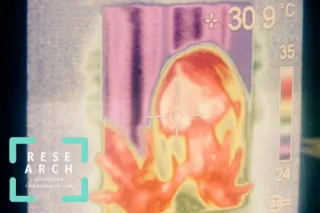
Infrared Thermography For Temperature Measurement and Non-Destructive Testing
The intensity of the infrared radiation emitted by objects is mainly a function of their temperature. In infrared thermography, this feature is used for multiple purposes: as a health indicator in med... ...more
Thermography Research & More
February 12, 2025•1 min read
